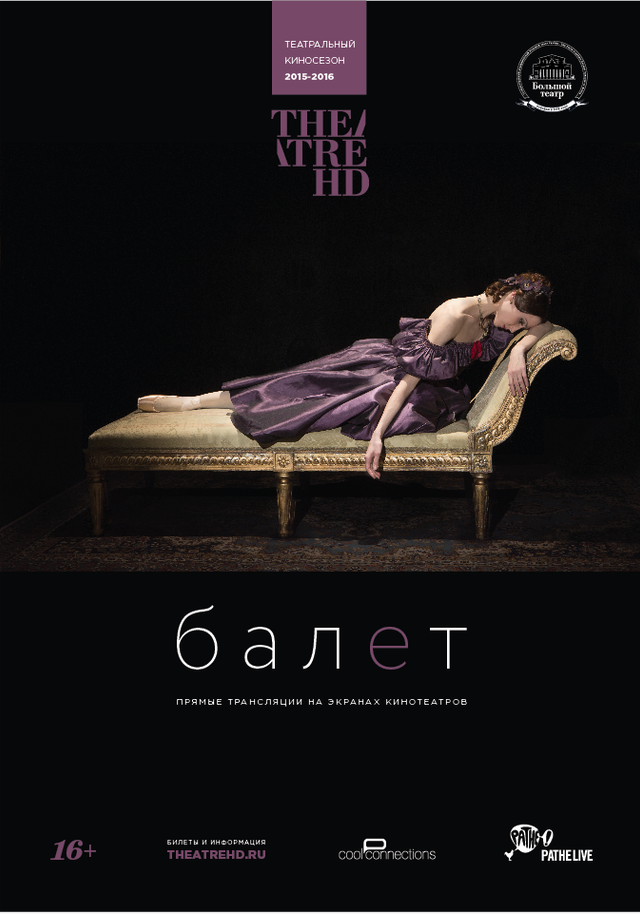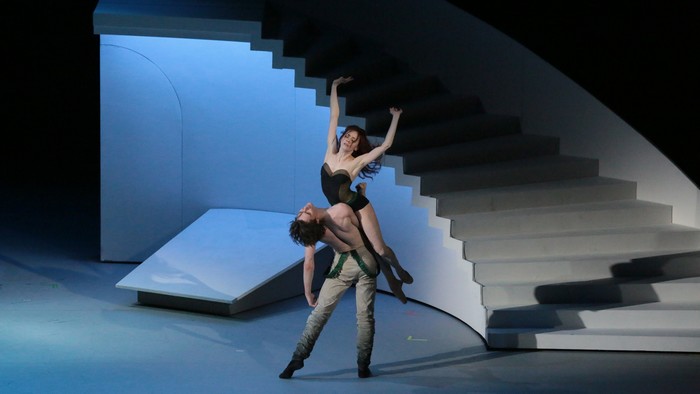Bolshoi Ballet 2015-2016
City:
Moscow
Cinemas:
Cinema Park Kaluzhskiy
Cinema Park Metropolis
CINEMA PARK Rivera
Documentary Film Center
Eldar
Formula Kino CDM
Formula Kino Chertanovo
Formula Kino Europa
Formula Kino Horizont
Formula Kino Praga
Formula Kino Rublevka
KARO 10 Schuka
KARO 11 Oktyabr
KARO 7 Atrium
KARO 8 Kapitoliy Vernadskogo
KARO 8 Yuzhnoe Butovo
KARO Sky 17 Aviapark
KARO Vegas 22
KINO OKKO Afimoll City
Luxor Center
Luxor Gudzon
Mori Cinema Kuntsevo
Dates:
01.10.2015-30.06.2016

Choose city for details:
- Almaty
- Arkhangelsk
- Astana
- Astrakhan
- Belgorod
- Berezniki
- Bryansk
- Chelyabinsk
- Cherepovets
- Fryazino
- Gomel
- Irkutsk
- Izhevsk
- Kaliningrad
- Kazan
- Khabarovsk
- Kirov
- Krasnodar
- Krasnoyarsk
- Kursk
- Miass
- Minsk
- Moscow
- Murmansk
- Mytishchi
- Naberezhnye Chelny
- Nizhny Novgorod
- Novokuznetsk
- Novosibirsk
- Omsk
- Orenburg
- Perm
- Petropavlovsk-Kamchatskiy
- Podolsk
- Reutov
- Rostov-on-Don
- Ryazan
- Saint Petersburg
- Samara
- Saratov
- Severodvinsk
- Sochi
- Stavropol
- Surgut
- Syktyvkar
- Tolyatti
- Tomsk
- Tula
- Tyumen
- Ufa
- Ulyanovsk
- Volgograd
- Vologda
- Voronezh
- Yaroslavl
- Yekaterinburg
- Zelenograd
- Zhukovka

Укрощение строптивой
The Taming of the Shrew
Country: Russia
Year: 2015
Cast: Ekaterina Krysanova, Vladislav Lantratov, Olga Smirnova, Semyon Chudin, Igor Tsvirko, Vyacheslav Lopatin, Yulia Grebenshikova, Artemiy Belyakov, Anna Tikhomirova, Georgiy Gusev
: Jean-Christophe Maillot
: Bernice Coppieters
: Ernest Pignon-Ernest
: Augustin Maillot
: Jean-Michel Laîné
: Dominique Drillot
: Stefani Matthieu
: Jean Rouaud
: Igor Dronov
Genre: ballet production
Language: English, French
Translation: russian subtitles
Time: 1 hour 54 minutes
Возраст: 16+
Assistant to Choreographer: Bernice Coppieters
Set Designer: Ernest Pignon-Ernest
Costume Designer: Augustin Maillot
Assistant to Costume Designer: Jean-Michel Laîné
Lighting & Video Projection: Dominique Drillot
Assistant: Stefani Matthieu
Dramatist: Jean Rouaud
Répétiteurs: Yan Godovsky, Victor Barykin, Josu Zabala
Music Director: Igor Dronov
ARGUMENT
Rather than a macho handbook, The Taming of the Shrew can be construed as an encounter between two forces of nature, who recognise one another at last. If they are abrupt, obnoxious, it stems from their solitude; they are fundamentally different from the society they live in, albatrosses among sparrows, and their excesses signal that they have yet to find a man (or a woman) who can measure up to them. Their love is out of the ordinary: while Petruchio could appear to be interested only in Baptista’s fortune, once the ink is dry on their marriage certificate, he doesn’t let go of Katharina. If he is interested, it’s by this woman; the real dowry, the actual gold mine, it’s her. He still needs to put her through a series of challenges to make sure that he wasn’t mistaken, that they are right for each other — measure for measure, so to speak. He was right. So was she. If she gives in to her husband’s demands, it’s not because she has found her master, but because she has met her match. Her submissiveness is an act. It hardly matters whether or not the sun is the moon, because the two of them have their own, extra-ordinary light. Petruchio isn’t fooled by by his wife’s new attitude. For the outside world, however, the prevalent social norms are safe. Everyone can breathe a sigh of relief: even the most reluctant among them have complied. In truth, Katharina and Petruchio play their parts in perfect harmony, and their singular tune sets them apart in what is a game of artifice.
THE CHARACTERS
Baptista is a rich gentleman who has two daughters: Katharina and Bianca. All would be well if the traditions of the time didn’t force him to marry his elder daughter first, when all the suitors queueing up at his door are interested solely in the agreeable Bianca. His daughters’ happiness doesn’t matter much to him: what he really wants is to have sons-in-law. Based on Katharina’s behaviour, however, he despairs of it ever happening.
Katharina has a comfortable dowry which ought to attract potential husbands, but she is also endowed with an attitude that frightens them off. No one knows what her violence hides, but she despises her sister’s bland suitors. Nothing seems to be good enough for her. Is hers an acute case of misanthropy or a singularly demanding character? Unbridled, Katharina lives on the edge.
Bianca, Baptista’s younger daughter, is hostage to Katharina‘s behaviour. As long as her sister keeps rejecting potential husbands, her many suitors will stay out of reach. The situation is cruel, because Bianca is as attractive as her sister is obnoxious. Hers are qualities that define the ideal woman in the society she lives in: fortune, grace, beauty and docility. Her sister will have none of it, however.
Gremio is an older gentleman, and could easily be one of the libidinous elders who spy on Susanna while she is bathing in the Book of Daniel. For him, the violent Katharina could never be Susanna, because she would have driven the voyeurs away ruthlessly. His Susanna is the chaste Bianca. Gremio’s appearance is off-putting, yet it doesn’t seem to hold him back as he attempts to woo her; he is living proof that money can distort one’s self-perception.
Hortensio, another one of Bianca’s suitors, is a dandy mainly concerned with himself and the rituals of high society. His interest is Bianca is mostly superficial, but he is the one who brings in his rude, boorish friend Petruchio, who may be able to solve the problem at hand.
Lucentio is a rich, idle youth. Well-bred and very charming, he could even fool people into believing he is well-read. He and Bianca come from the same world, they are the same age, and share the same yearning in love. As Juliette Greco once sang: "Let’s marry them, let’s marry them, I think they are very much alike".[1] Nobody would object to it — aside from Katharina.
Petruchio: There comes the monster — the one Hortensio believes to be able to accept, if not seduce, the monstrous Katharina as his wife. Hortensio thinks Petruchio will have low expectations; he is mistaken, and evidently doesn’t understand the man he calls his friend. Nobody comes close to this seemingly vulgar, shameless man, however, because he is the only one who will “see” Katharina. And he sees her as his equal, as unconcerned with etiquette and norms as himself. Monsters may be alone in their clairvoyance, after all.
Grumio, Petruccio’s servant, is cowardly and servile. That’s what’s expected of him. He may also be an accomplice to his master’s tricks and schemes.
The Widow is hardly disconsolate, and has no intention of remaining a widow. She sets her conditions, however: her second husband needs to belong to her world and to be rich. She can put up with the rest. She soon sets her sights on Hortensio.
The Housekeeper has been running the household for so long that she ought to be able to lay claim to Baptista, but he cares solely about his daughters. Since the house will soon be empty and her services no longer needed, she is wearily willing to accept Gremio’s advances. She may not love him, but it means she will be able to live comfortably and marry into the upper class, whose superiority is based on arrogance and money.
E.Fetisova.jpg)